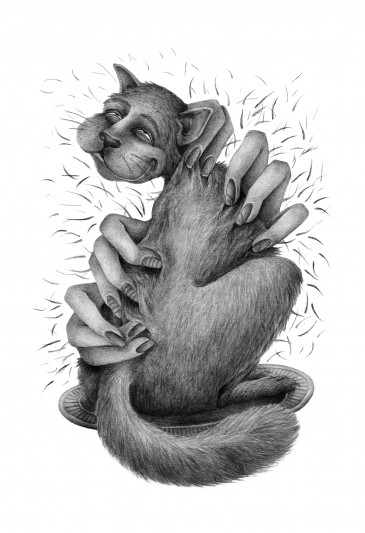
“I was really hesitant to put something out with a cat name in it. To tell you the truth, I don’t even really like cats. I’m not a big animal person.” Cary Pratt, humble and soft-spoken, meets me in a cozy coffee shop in the West End. It’s pouring outside, and I’m wearing nothing over my button up shirt — rain water drips to the floor as we sit down. Swirling his Americano in his hands, Pratt praises the spot as one of the only shops in the city to make a decent cup of decaf; he rarely drinks caffeine.
You wouldn’t know it to listen to his records; Pratt’s work as Prairie Cat is practically overflowing with jittery energy. Under his feline moniker, Pratt has released three full-length LPs and one EP of hazy, washed-out bubblegum pop, all with a healthy dose of cynical detachment that’s fast becoming his trademark. Who Knows Where to Begin? is his latest release, and it’s also his strongest — there’s a spirit of almost childlike wonder to Pratt’s inventiveness in the studio and unpretentious mastery of melody.
The Prairie Cat project is a far cry from Pratt’s day job as a studio drummer. “Going into the studio as a drummer, and playing on other people’s records, it’s already kind of set up. You don’t really have a lot of input,” Pratt says. “If it’s someone else’s record and I’m getting paid just to be there, I’m not going to go in and start playing around with different ideas.
“I think this record and the reason this project is the way it is, is I get to have the time to do that — whether it’s good or bad, whether it’s a big mistake or whether it sounds good — I’m able to go in and try it, at least.”’
Each of the LP’s nine tracks bear the markings of Pratt’s distinctive creative flair. “Upright Beast,” written about the frustration of riding Vancouver’s overcrowded buses, is a goofy slow jam full of spitfire orchestral intermissions; earlier in the record, Pratt stretches the tempo of opener “Who Knows Where to Begin,” like a rubber band, only to have it snap back near the song’s end. Bonus track, “On a Lamb,” is the record’s black sheep, more electronic and atmospheric than the previous eight — it was recorded with Steve Bays of Hot Hot Heat. “We just kind of hung out and mixed it, and I decided to just throw it on [the record],” Pratt says.
Apart from input from local musicians, Pratt says a lot of the record’s improvisational spirit is due to the level-headed guidance of producer Ryan Dahle. “He just brings this reassurance, and this kind of mentorship that’s like: thisis how records are made, this is how you should do this,” Pratt says. “Which is really cool, because there are so many choices, and with a guy like him that’s made so many records, he really knows how to avoid those dead ends and cul de sacs that he’s seen people go down before.”
Who Knows Where to Begin? is full of creative instrumentation and charming piano playing, but it’s Pratt’s dry vocal delivery and disarming lyrics that really make it come together. The record’s standout tracks centre around the difficulties of interpersonal relationships: album highlight “Bad Storm” tells of taking refuge at a friend’s place to avoid the fallout of a relationship gone sour.
According to Pratt, the new record relies less on autobiographical tales than his previous releases, focussing instead on the stories of others. “Not writing from personal experience is a new thing for me, too,” he notes. “Writing assomeone else, it’s easier to take on a different persona and not have to be as careful.”
What you’re not hearing on the record, though, is some of its more supernatural influences; according to Pratt, he was only seconds away from recording the rattles of a Vogue Theatre ghost. “There’s always that chance that something’s gonna happen when you’re there late at night. That kind of open feeling, the different atmosphere, it makes you play different,” he says. “The first night I was there, I was recording a piano on stage, and just had my headphones on; I had turned up the preamp, and you start to hear the room a bit more, you start to hear traffic outside.
“It’s super late at night, and all of a sudden, I hear this ‘thump, thump,’ and it’s two of the theatre seats in the upper balcony, just kind of lifting up. I was so close to hitting record just before that. I wish I’d gotten it on tape!” No telling whether closer listens to the record might reveal some evidence of the supernatural.
Though Who Knows has more than likely introduced plenty of new listeners to the world of Prairie Cat, Pratt isn’t looking forward to headlining festivals or landing Rolling Stone cover stories. “I’ve always tried to gear [Prairie Cat] towards being a recording project: being something people can access if they want to hear songs, but with no pressure to go out and market it and sell it,” he says. “So much of music is having to get on board with something; with Prairie Cat, there’s not too much to get on board with.”
Ultimately, he says, being involved with other Vancouver acts who’re gaining mainstream success is more than enough. “I think there’s kind of two worlds I’m involved with, and they only overlap a little bit. It’s a venn diagram,” he says. “I still want to keep it [Prairie Cat] in a space where there’s no expectations. With this project especially, it’s just like, I’m making some music — I’m not the best singer, I’m not the best piano player, I’m not even the best drummer, but I’m trying to make something from nothing. It’s not anything bigger or smaller than that; it’s just some songs.”

